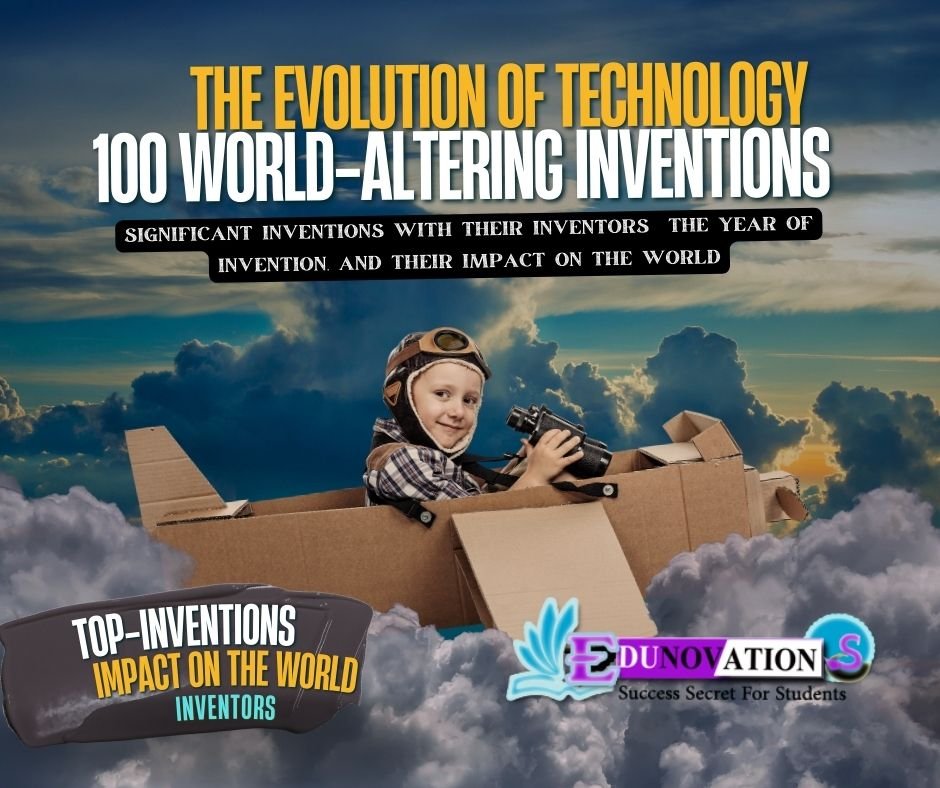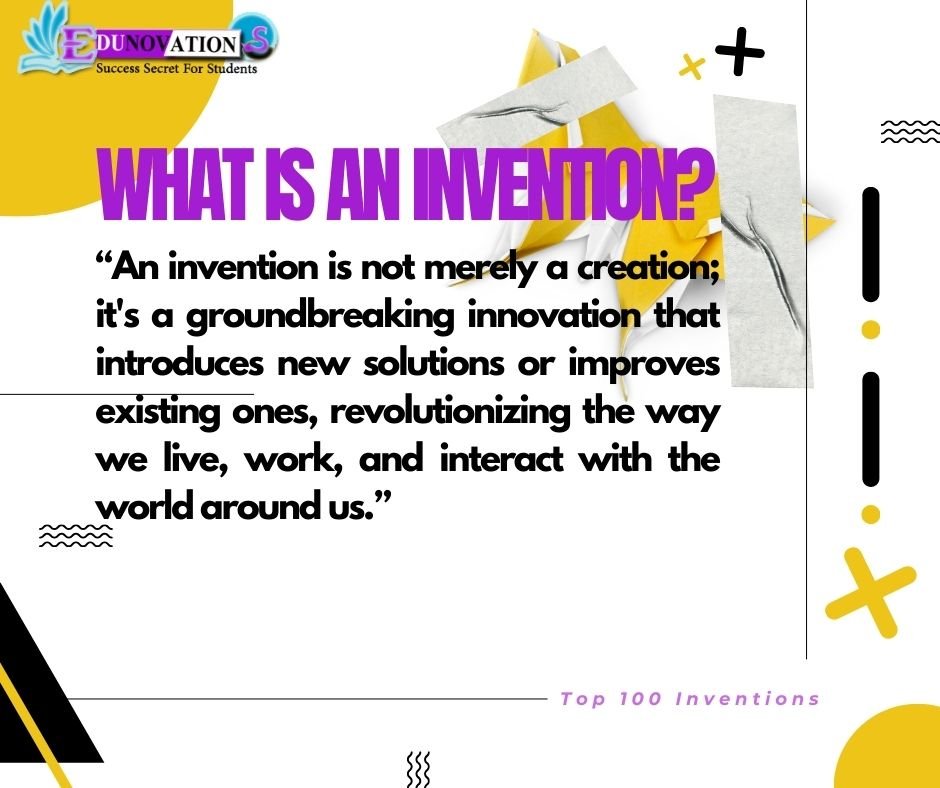List of Top 100 inventions with their inventors , the year of invention, and their impact on the world
 100 World-Altering Inventions
100 World-Altering InventionsList of Top 100 inventions, 100 Inventions That Shaped the World, From the Wheel to AI: A Century of Transformative Inventions, Innovations that Changed Humanity: A History of Top100 Inventions.
Unlocking the Power of Inventions: How They Shape Our World
In a rapidly evolving world, where technological advancements continue to astonish us, it’s important to understand the essence of inventions, their significance, and the transformative impact they have on society. In this article, we’ll explore what an invention is, why inventions are vital, and how they have reshaped the world as we know it.
What is an Invention?
An invention is not merely a creation; it’s a groundbreaking innovation that introduces new solutions or improves existing ones, revolutionizing the way we live, work, and interact with the world around us. Inventions can take various forms, from tangible devices to intangible systems and concepts. They encompass a wide spectrum, ranging from the wheel, discovered thousands of years ago, to cutting-edge technologies like artificial intelligence and gene editing today.

List of Top 100 inventions with their inventors , the year of invention, and their impact on the world
| Serial No. | Invention | Inventor(s) | Year of Invention | Impact on the World |
| 1 | Wheel | Unknown | Circa 3500 BC | Revolutionized transportation and machinery. |
| 2 | Fire | Unknown | Prehistoric | Provided warmth, safety, and cooking. |
| 3 | Agriculture (Farming) | Various | Neolithic Era | Enabled settled communities and surplus food production. |
| 4 | Writing (Cuneiform, Hieroglyphics) | Various | Circa 3500 BC | Facilitated record-keeping and communication. |
| 5 | The Wheel and Axle | Unknown | Circa 3500 BC | Enhanced the efficiency of vehicles and machines. |
| 6 | Mathematics (Number System) | Various | Ancient Times | Formed the basis for scientific and engineering progress. |
| 7 | Pottery | Unknown | Prehistoric | Created containers for storage and cooking. |
| 8 | Metallurgy | Various | Ancient Times | Led to the development of metal tools and weapons. |
| 9 | Plow | Various | Ancient Times | Improved agricultural productivity. |
| 10 | Calendar | Various | Ancient Times | Helped in tracking time and scheduling activities. |
| 11 | Currency and Coinage | Various | Ancient Times | Simplified trade and economic transactions. |
| 12 | Waterwheel | Various | Ancient Times | Used for milling grain and other mechanical tasks. |
| 13 | Paper | Cai Lun (China) | 105 AD | Revolutionized writing and information storage. |
| 14 | Compass | Various (China) | 2nd Century BC | Transformed navigation and exploration. |
| 15 | Gunpowder | Various (China) | 9th Century AD | Changed warfare and led to the development of firearms. |
| 16 | Printing Press | Johannes Gutenberg | 1440 | Enabled mass production of books, spreading knowledge. |
| 17 | Telescope | Hans Lippershey (Galileo improved) | Early 17th century | Revolutionized astronomy and our understanding of space. |
| 18 | Microscope | Anton van Leeuwenhoek | Late 17th century | Opened the world of microorganisms to scientific study. |
| 19 | Steam Engine | James Watt | 1769 | Powered the Industrial Revolution, transformed society. |
| 20 | Telegraph | Samuel Morse | 1837 | Revolutionized long-distance communication. |
| 21 | Photography | Joseph Nicéphore Niépce | 1826 (First photo) | Changed art, journalism, and documentation. |
| 22 | Telephone | Alexander Graham Bell | 1876 | Made real-time voice communication possible. |
| 23 | Light Bulb | Thomas Edison | 1879 | Brought artificial light to homes and workplaces. |
| 24 | Phonograph | Thomas Edison | 1877 | Pioneered audio recording and playback. |
| 25 | Radio | Guglielmo Marconi | Late 19th century | Revolutionized communication and broadcasting. |
| 26 | Automobile | Karl Benz (First gasoline car) | 1885 | Transformed transportation and society. |
| 27 | Airplane | Wright Brothers | 1903 | Revolutionized travel and global connectivity. |
| 28 | Penicillin | Alexander Fleming | 1928 | Pioneered antibiotics, saving countless lives. |
| 29 | Atomic Bomb | Multiple scientists (Manhattan Project) | 1945 | Changed the course of history, ending WWII. |
| 30 | Television | John Logie Baird (mechanical TV) | 1927 | Revolutionized entertainment and information sharing. |
| 31 | Microwave Oven | Percy Spencer | 1945 | Revolutionized cooking and food preparation. |
| 32 | Computer | Various | Early 20th century | Transformed information processing and automation. |
| 33 | Transistor | John Bardeen, Walter Brattain, William Shockley | 1947 | Enabled modern electronics, including computers. |
| 34 | DNA Double Helix | James Watson, Francis Crick | 1953 | Revolutionized genetics and our understanding of DNA. |
| 35 | Satellite | Sputnik (First artificial satellite) | 1957 | Transformed telecommunications and space exploration. |
| 36 | Integrated Circuit (Microchip) | Jack Kilby, Robert Noyce | Late 1950s | Enabled the miniaturization of electronics. |
| 37 | Laser | Arthur Schawlow, Charles Townes | 1958 | Revolutionized various fields, including medicine. |
| 38 | GPS (Global Positioning System) | U.S. Department of Defense | 1970s | Revolutionized navigation and location-based services. |
| 39 | Internet | Various (ARPANET, Tim Berners-Lee) | 1960s, 1989 | Connected the world, reshaped communication and commerce. |
| 40 | Fiber Optics | Various | 1970s | Revolutionized telecommunications and data transfer. |
| 41 | Barcodes | Norman Woodland, Bernard Silver | 1948 | Streamlined inventory management and retail. |
| 42 | MRI (Magnetic Resonance Imaging) | Raymond Damadian | 1977 | Transformed medical imaging and diagnosis. |
| 43 | Solar Cell | Charles Fritts | 1883 | Provided renewable energy from sunlight. |
| 44 | Artificial Heart | Robert Jarvik | 1982 | Pioneered the development of artificial organs. |
| 45 | Personal Computer | Various (IBM, Apple, etc.) | 1970s | Transformed personal and professional computing. |
| 46 | Video Games | Ralph Baer (First home video game) | 1967 | Revolutionized entertainment and gaming industry. |
| 47 | Mobile Phone | Martin Cooper | 1973 | Revolutionized personal communication and mobility. |
| 48 | World Wide Web | Tim Berners-Lee | 1989 | Changed how we access and share information globally. |
| 49 | Digital Camera | Steven Sasson | 1975 | Revolutionized photography and imaging technology. |
| 50 | Ray Tomlinson | 1971 | Transformed communication and business interactions. | |
| 51 | 3D Printing | Charles Hull (Stereolithography) | 1986 | Enabled rapid prototyping and custom manufacturing. |
| 52 | Hubble Space Telescope | NASA, ESA | 1990 | Advanced our understanding of the universe. |
| 53 | Human Genome Mapping | Various (Human Genome Project) | 2003 | Opened doors to personalized medicine and genetics. |
| 54 | DVD | Various | 1990s | Replaced VHS and improved video storage and quality. |
| 55 | MP3 Player | Various (Apple iPod, etc.) | Late 1990s | Revolutionized music consumption and portability. |
| 56 | E-Book | Michael Hart (Project Gutenberg) | 1971 | Transformed reading and publishing industries. |
| 57 | RFID (Radio-Frequency Identification) | Charles Walton | 1969 | Revolutionized inventory management and tracking. |
| 58 | CRISPR-Cas9 Gene Editing | Jennifer Doudna and Emmanuelle Charpentier | 2012 | Enabled precise gene editing, potential for medical breakthroughs. |
| 59 | Smartphones | Various (Apple, Samsung, etc.) | Late 2000s | Combined multiple technologies in a handheld device. |
| 60 | Self-Driving Cars | Various (Tesla, Waymo, etc.) | 2000s | Transforming transportation and urban planning. |
| 61 | Electric Cars | Various (Tesla, Nissan, etc.) | Late 20th century | Promoting sustainable transportation. |
| 62 | Blockchain Technology | Satoshi Nakamoto (Bitcoin) | 2008 | Revolutionizing finance, supply chain, and more. |
| 63 | Virtual Reality | Various (Oculus, HTC, etc.) | 1990s (concept), 2010s (consumer) | Changing entertainment, education, and training. |
| 64 | Augmented Reality | Various (Google Glass, Microsoft HoloLens, etc.) | 1990s (concept), 2010s (consumer) | Enhancing real-world experiences and information. |
| 65 | Quantum Computing | Various | Ongoing research | Potential to revolutionize computing and cryptography. |
| 66 | Artificial Intelligence | Various | Ongoing research | Transforming industries, from healthcare to finance. |
| 67 | Touchscreen Technology | Various | 1970s (concept), 2000s (widespread) | Changing user interfaces and devices. |
| 68 | Internet of Things (IoT) | Various | Ongoing development | Connecting everyday objects to the internet. |
| 69 | Cloud Computing | Various | 2000s | Revolutionizing data storage and access. |
| 70 | Robotics | Various | Ongoing development | Transforming manufacturing, healthcare, and more. |
| 71 | Drones | Various | Late 20th century (concept), 2010s (consumer) | Changing industries from photography to agriculture. |
| 72 | Biotechnology | Various | Ongoing development | Advancing healthcare, agriculture, and more. |
| 73 | Nanotechnology | Various | Ongoing development | Creating materials and devices at the nanoscale. |
| 74 | Wearable Technology | Various (Fitbit, Apple Watch, etc.) | 2010s | Enhancing health monitoring and daily life. |
| 75 | 3D Printing in Medicine | Various | Ongoing development | Custom implants, prosthetics, and medical devices. |
| 76 | Bioinformatics | Various | Ongoing development | Analyzing biological data for medical advancements. |
| 77 | Precision Agriculture | Various | Ongoing development | Optimizing farming practices with data and technology. |
| 78 | Genetic Engineering | Various | Ongoing development | Modifying organisms for various purposes. |
| 79 | Space Exploration (Rockets, Space Shuttles) | Various | 20th century | Expanding our knowledge of the universe and technology. |
| 80 | Space Probes (Voyager, Mars Rovers) | NASA, ESA, Other Space Agencies | Ongoing missions | Investigating other planets and celestial bodies. |
| 81 | International Space Station (ISS) | NASA, ESA, Other Space Agencies | 1998-present | Advancing scientific research in space. |
| 82 | Human Spaceflight | Yuri Gagarin (First human in space) | 1961 | Pioneering human presence beyond Earth. |
| 83 | In vitro Fertilization (IVF) | Robert Edwards and Patrick Steptoe | 1978 | Revolutionized fertility treatment. |
| 84 | Organ Transplants | Various | Ongoing development | Saving countless lives through organ transplantation. |
| 85 | Birth Control Pill | Various | 1960 | Empowered women’s reproductive choices. |
| 86 | Antibiotics | Alexander Fleming and others | 1928 (Penicillin) | Revolutionized medicine and reduced infections. |
| 87 | Vaccination | Edward Jenner (Smallpox vaccine) | 1796 | Preventing deadly diseases and improving public health. |
| 88 | X-Ray Machine | Wilhelm Conrad Roentgen | 1895 | Revolutionized medical imaging and diagnostics. |
| 89 | MRI | Paul Lauterbur and Peter Mansfield | 1977 (NMR imaging) | Non-invasive imaging for medical diagnosis. |
| 90 | Ultrasound | Karl Dussik and others | 1950s | Non-invasive imaging for medical diagnosis. |
| 91 | Electron Microscope | Max Knoll and Ernst Ruska | 1931 | Revealed the nanoscale structure of materials. |
| 92 | Green Revolution (Hybrid Crops) | Norman Borlaug | 1940s-1960s | Increased global food production and reduced hunger. |
| 93 | Artificial Intelligence in Healthcare | Various | Ongoing development | Enhancing medical diagnosis and treatment. |
| 94 | CRISPR Gene Editing for Therapies | Jennifer Doudna, Emmanuelle Charpentier, and others | 2012 | Potential for treating genetic diseases. |
| 95 | Clean Energy Technologies (Wind, Solar) | Various | Ongoing development | Addressing climate change and transitioning to renewables. |
| 96 | Geothermal Energy | Various | Ancient Times, 20th century | Utilizing Earth’s heat for energy. |
| 97 | Hydraulic Fracturing (Fracking) | Various | 1940s (concept), 2000s (widespread) | Changing energy production and economics. |
| 98 | Nuclear Energy | Various | 20th century | Providing a powerful source of electricity. |
| 99 | Deep Learning | Geoffrey Hinton, Yann LeCun, and Yoshua Bengio | 1980s-2000s | Advancing artificial intelligence and machine learning. |
| 100 | Autonomous Vehicles (Self-Driving Cars) | Various (Waymo, Tesla, etc.) | 2000s | Transforming transportation, safety, and urban planning. |

The Importance of Inventions
Inventions are the lifeblood of progress, propelling humanity forward in countless ways. Here’s why they are so crucial:
- Solving Problems: Inventions are born out of the need to address challenges, whether they are related to health, transportation, communication, or any other aspect of our lives. They provide solutions that make our daily routines more efficient and enjoyable.
- Fostering Innovation: Inventions inspire further innovation. They serve as building blocks for future developments, sparking a chain reaction of creativity and discovery.
- Economic Growth: Innovative inventions drive economic growth by creating new industries, generating employment opportunities, and contributing to a nation’s GDP. They enhance our quality of life and our ability to compete on a global scale.
- Enhancing Well-Being: Inventions in fields such as medicine, sanitation, and agriculture have greatly improved public health and longevity. Vaccines, antibiotics, and modern healthcare systems are all examples of inventions that have saved countless lives.
- Cultural and Societal Shifts: Inventions have the power to shape cultural norms and societal structures. Consider how the printing press transformed the spread of knowledge and the internet’s impact on global communication.

How Inventions Change the World
The transformative influence of inventions is undeniable. Here are some ways they have reshaped our world:
- Communication Revolution: Inventions like the telegraph, telephone, and the internet have revolutionized how we connect and share information globally, bridging geographical gaps and fostering cultural exchange.
- Transportation Evolution: From the invention of the wheel to the development of self-driving cars, transportation inventions have expanded our horizons and connected distant corners of the world, driving economic growth and cultural exchange.
- Medical Breakthroughs: Inventions in medicine, such as vaccines, antibiotics, and medical imaging technologies, have increased life expectancy and improved overall well-being.
- Energy Innovation: The invention of electricity and subsequent developments in clean energy technologies have powered industries, homes, and cities, reducing our reliance on finite resources and mitigating environmental impacts.
- Digital Revolution: Inventions in the field of computing, from the first computers to modern artificial intelligence, have transformed the way we work, communicate, and even think.
In conclusion, inventions are not just creations; they are catalysts for progress and the embodiment of human ingenuity. They have the power to shape our lives, foster innovation, and drive positive change on a global scale. As we continue to witness the evolution of technology and new breakthroughs, we can only anticipate that inventions will remain at the forefront of shaping our future. Embracing and supporting innovation is not just a choice; it’s a necessity if we want to continue evolving as a society and improving the human condition.












